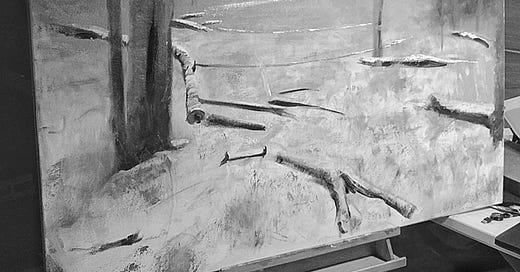And I Stopped Walking
This is not about art unless you count learning how to live and let go as an art.
Something described isn’t necessarily known. I could describe Kate, but, in the end, even I did not know her. She was a wanderer, putting her face into the wind pushed by coming rain, going where she wanted. Free. I don’t know where she came from originally, but she came to me through my cousin and her husband, who found the company of her and her sister a bit too much to handle. So, she came to me. Together, five of us would walk the paths around the property, just being thankful to be out. Well, I would walk the paths. Kate and the others have their own ways and means of reaching out for life, and I admit, they are better at living in the moment than I am. As we walk, my past mistakes wrestle with my plans and hopes, but walking always helps. It puts us back into tempo with the Earth and creation. Woods were not made to be sped through. Fallen trees, gulleys, steep or slippery ways are all just trying to teach, and real learning comes not by cramming, but by slow absorption and repeated exposure. Ponds were made for reflection. Creeks, for learning language and release. Where else can you see the sky in water or hear ancient words flow by in conversation or — by seeing the futility of holding back the creek with your hand — learn release?
So it was that while we were out on the familiar paths, I looked right and I stopped walking.
Fallen snow had revealed a divergent cow path that split around a tree and reconnected to continue toward the pond, up the rise and out of sight. A tree, long fallen, angled toward me and I saw bones in its form. Decayed, the old trunk and limbs lay somewhat flat on the ground, unlike a new fall, whose diameter defies gravity for as long as it can. Here, the Earth was slowly pulling the remains into itself, leaves and grasses clumping beside. The brighter snow on top contrasting with the belly of the tree-bones gave stark contrast and a very nice scene to look upon, a scene that any painter or poet would tuck carefully into their front pocket. I remember thinking, “Beautiful. I wish I didn’t see bones.”
I pocketed the scene and our troupe continued down through the gate that’s never closed, passed the area where hay is left, through another gate, right, then up the slope to home.
It was beautiful. A little snow, a nice walk. Contentment for all. Peace.
It had been cold and wet for a long time. So, when a 60-degree day came, three of our group did what any of us would do — they got out in the sunshine. Soggy, but sunny and warm. One good day out of a long stretch of cold, wet weather. But the rain returned, puddles grew. The night came. Two of three returned. My guts turned into snakes.
I buried Kate in a Sunday morning drizzle. I could describe it to you, but you wouldn’t necessarily know unless you’re the type that doesn’t choose many things and then loses one of the few things you’ve chosen. I will plant flowers around her and eventually make her place one where people will not just drive by but will stop and see. It will be a slow, beautiful process.
This is how we live. We place our hands into running waters hoping to catch or to slow or to stop, but the water just flows by. We see reflections. We walk paths. Where there are bones, we make gardens. This is not some evolved sensibility. This Eden’s Echo, our Maker’s voice telling us to press on, to keep our tear-filled eyes up, and to rest in the knowledge that He makes all things new.





